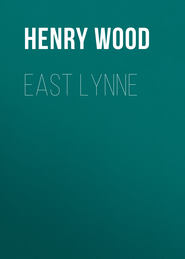По всем вопросам обращайтесь на: info@litportal.ru
(©) 2003-2024.
✖
Johnny Ludlow, Sixth Series
Настройки чтения
Размер шрифта
Высота строк
Поля
Johnny Ludlow, Sixth Series
Henry Wood
Mrs. Henry Wood
Johnny Ludlow, Sixth Series
“God sent his Singers upon earth
With songs of sadness and of mirth,
That they might touch the hearts of men,
And bring them back to heaven again.”
Longfellow.
THE MYSTERY AT NUMBER SEVEN
I.—MONTPELLIER-BY-SEA
“Let us go and give her a turn,” cried the Squire.
Tod laughed. “What, all of us?” said he.
“To be sure. All of us. Why not? We’ll start to-morrow.”
“Oh dear!” exclaimed Mrs. Todhetley, dismay in her mild tones. “Children and all?”
“Children and all; and take Hannah to see to them,” said the Squire. “You don’t count, Joe: you will be off elsewhere.”
“We could never be ready,” said the Mater, looking the image of perplexity. “To-morrow’s Friday. Besides, there would be no time to write to Mary.”
“Write to her!” cried the Squire, turning sharply on his heel as he paced the room in his nankeen morning-coat. “And who do you suppose is going to write to her? Why, it would cause her to make all sorts of preparation, put her to no end of trouble. A pretty conjurer you’d make! We will take her by surprise: that’s what we will do.”
“But if, when we got there, we should find her rooms are let, sir?” said I, the possibility striking me.
“Then we’ll go into others, Johnny. A spell at the seaside will be a change for us all.”
This conversation, and the Squire’s planning-out, arose through a letter we had just received from Mary Blair—poor Blair’s widow, if you have not forgotten him, who went to his end through that Gazette of Jerry’s. After a few ups and downs, trying at this thing for a living, trying at that, Mrs. Blair had now settled in a house at the seaside, and opened a day-school. She hoped to get on in it in time, she wrote, especially if she could be so fortunate as to let her drawing-room to visitors. The Squire, always impulsive and good-hearted, at once cried out that we would go and take it.
“It will be doing her a good turn, you see,” he ran on; “and when we leave I dare say she’ll find other people ready to go in. Let’s see”—picking up the letter to refer to the address—“No. 6, Seaboard Terrace, Montpellier-by-Sea. Whereabouts is Montpellier-by-Sea?”
“Never heard of it in my life,” cried Tod. “Don’t believe there is such a place.”
“Be quiet, Joe. I fancy it lies somewhere towards Saltwater.”
Tod flung back his head. “Saltwater! A nice common place that is!”
“Hold your tongue, sir. Johnny, fetch me the railway guide.”
Upon looking at the guide, it was found there; “Montpellier-by-Sea;” the last station before getting to Saltwater. As to Saltwater, it might be common, as Tod said; for it was crowded with all sorts of people, but it was lively and healthy.
Not on the next day, Friday, for it was impossible to get ready in such a heap of a hurry, but on the following Tuesday we started. Tod had left on the Saturday for Gloucestershire. His own mother’s relatives lived there, and they were always inviting him.
“Montpellier-by-Sea?” cried the railway clerk in a doubting tone as we were getting the tickets. “Let’s see? Where is that?”
Of course that set the Squire exploding. What right had clerks to pretend to issue tickets unless they knew their business? The clerk in question coolly ran his finger down the railway list he had turned to, and then gave us the tickets.
“It is a station not much frequented, you see,” he civilly observed. “Travellers mostly go on to Saltwater.”
But for the train being due, and our having to make a rush for the platform, the Squire would have waited to give the young man a piece of his mind. “Saltwater, indeed!” said he. “I wonder the fellow does not issue his edict as to where people shall go and where they shan’t go.”
We arrived in due time at our destination. It was written up as large as life on a white board, “Montpellier-by-Sea.” A small roadside station, open to the country around; no signs of sea or of houses to be seen; a broad rural district, apparently given over entirely to agriculture. On went the whistling train, leaving the group of us standing by our luggage on the platform. The Squire was staring about him doubtfully.
“Can you tell me where Seaboard Terrace is?”
“Seaboard Terrace?” repeated the station-master. “No, sir, I don’t know it. There’s no terrace of that name hereabouts. For that matter there are no terraces at all—no houses in fact.”
The Squire’s face was a picture. He saw that (save a solitary farm homestead or two) the country was bare of dwelling-places.
“This is Montpellier-by-Sea?” he questioned at last.
“Sure enough it is, sir. Munpler, it’s called down here.”
“Then Seaboard Terrace must be somewhere in it—somewhere about. What a strange thing!”
“Perhaps the gentlefolks want to go to Saltwater?” spoke up one of the two porters employed at the little station. “There’s lots of terraces there. Here, Jim!”—calling to his fellow—“come here a minute. He’ll know, sir; he comes from Saltwater.”
Jim approached, and settled the doubt at once. He knew Seaboard Terrace very well indeed; it was at Saltwater; just out at the eastern end of it.
Yes, it was at Saltwater. And there were we, more than two miles off it, on a broiling hot day, when walking was impracticable, with all our trunks about us, and no fly to be had, or other means of getting on. The Squire went into one of his passions, and demanded why people living at Saltwater should give their address as Montpellier-by-Sea.
He had hardly patience to listen to the station-master’s explanation—who acknowledged that we were not the first travelling party that had been deluded in like manner. Munpler (as he and the rest of the natives persisted in calling it) was an extensive, straggling rural parish, filled with farm lands; an arm of it extended as far as Saltwater, and the new buildings at that end of Saltwater had rechristened themselves Montpellier-by-Sea, deeming it more aristocratic than the common old name. Had the Squire been able to transport the new buildings, builders and all, he had surely done it on the spot.
Well, we got on to Saltwater in the evening by another train, and to No. 6, Seaboard Terrace. Mary Blair was just delighted.
“If I had but known you were coming, if you had only written to me, I would have explained that it was Saltwater Station you must get out at, not Montpellier,” she cried in deprecation.
“But, my dear, why on earth do you give in to a deception?” stormed the Squire. “Why call your place Montpellier when it’s Saltwater?”
“I do what other people do,” she sighed; “I was told it was Montpellier when I came here. Generally speaking, I have explained, when writing to friends, that it is really Saltwater, in spite of its fine name. I suppose I forgot it when writing to you—I had so much to say. The people really to blame are those who named it so.”
“And that’s true, and they ought to be shown up,” said the Squire.
Seaboard Terrace consisted of seven houses, built in front of the sea a little beyond the town. The parlours had bay windows; the drawing-rooms had balconies and verandahs. The two end houses, Nos. 1 and 7, were double houses, large and handsome, each of them being inhabited by a private family; the middle houses were smaller, most of them being let out in lodgings in the season. Mary Blair began talking that first evening as we sat together about the family who lived in the house next door to her, No. 7. Their name was Peahern, she said, and they had been so very, very kind to her since she took her house in March. Mr. Peahern had interested himself for her and got her several pupils; he was much respected at Saltwater. “Ah, he is a good man,” she added; “but–”
“I’ll call and thank him,” interrupted the Squire. “I am proud to shake hands with such a man as that.”
“You cannot,” she said; “he and his wife have gone abroad. A great misfortune has lately befallen them.”
“A great misfortune! What was it?”
Henry Wood
Mrs. Henry Wood
Johnny Ludlow, Sixth Series
“God sent his Singers upon earth
With songs of sadness and of mirth,
That they might touch the hearts of men,
And bring them back to heaven again.”
Longfellow.
THE MYSTERY AT NUMBER SEVEN
I.—MONTPELLIER-BY-SEA
“Let us go and give her a turn,” cried the Squire.
Tod laughed. “What, all of us?” said he.
“To be sure. All of us. Why not? We’ll start to-morrow.”
“Oh dear!” exclaimed Mrs. Todhetley, dismay in her mild tones. “Children and all?”
“Children and all; and take Hannah to see to them,” said the Squire. “You don’t count, Joe: you will be off elsewhere.”
“We could never be ready,” said the Mater, looking the image of perplexity. “To-morrow’s Friday. Besides, there would be no time to write to Mary.”
“Write to her!” cried the Squire, turning sharply on his heel as he paced the room in his nankeen morning-coat. “And who do you suppose is going to write to her? Why, it would cause her to make all sorts of preparation, put her to no end of trouble. A pretty conjurer you’d make! We will take her by surprise: that’s what we will do.”
“But if, when we got there, we should find her rooms are let, sir?” said I, the possibility striking me.
“Then we’ll go into others, Johnny. A spell at the seaside will be a change for us all.”
This conversation, and the Squire’s planning-out, arose through a letter we had just received from Mary Blair—poor Blair’s widow, if you have not forgotten him, who went to his end through that Gazette of Jerry’s. After a few ups and downs, trying at this thing for a living, trying at that, Mrs. Blair had now settled in a house at the seaside, and opened a day-school. She hoped to get on in it in time, she wrote, especially if she could be so fortunate as to let her drawing-room to visitors. The Squire, always impulsive and good-hearted, at once cried out that we would go and take it.
“It will be doing her a good turn, you see,” he ran on; “and when we leave I dare say she’ll find other people ready to go in. Let’s see”—picking up the letter to refer to the address—“No. 6, Seaboard Terrace, Montpellier-by-Sea. Whereabouts is Montpellier-by-Sea?”
“Never heard of it in my life,” cried Tod. “Don’t believe there is such a place.”
“Be quiet, Joe. I fancy it lies somewhere towards Saltwater.”
Tod flung back his head. “Saltwater! A nice common place that is!”
“Hold your tongue, sir. Johnny, fetch me the railway guide.”
Upon looking at the guide, it was found there; “Montpellier-by-Sea;” the last station before getting to Saltwater. As to Saltwater, it might be common, as Tod said; for it was crowded with all sorts of people, but it was lively and healthy.
Not on the next day, Friday, for it was impossible to get ready in such a heap of a hurry, but on the following Tuesday we started. Tod had left on the Saturday for Gloucestershire. His own mother’s relatives lived there, and they were always inviting him.
“Montpellier-by-Sea?” cried the railway clerk in a doubting tone as we were getting the tickets. “Let’s see? Where is that?”
Of course that set the Squire exploding. What right had clerks to pretend to issue tickets unless they knew their business? The clerk in question coolly ran his finger down the railway list he had turned to, and then gave us the tickets.
“It is a station not much frequented, you see,” he civilly observed. “Travellers mostly go on to Saltwater.”
But for the train being due, and our having to make a rush for the platform, the Squire would have waited to give the young man a piece of his mind. “Saltwater, indeed!” said he. “I wonder the fellow does not issue his edict as to where people shall go and where they shan’t go.”
We arrived in due time at our destination. It was written up as large as life on a white board, “Montpellier-by-Sea.” A small roadside station, open to the country around; no signs of sea or of houses to be seen; a broad rural district, apparently given over entirely to agriculture. On went the whistling train, leaving the group of us standing by our luggage on the platform. The Squire was staring about him doubtfully.
“Can you tell me where Seaboard Terrace is?”
“Seaboard Terrace?” repeated the station-master. “No, sir, I don’t know it. There’s no terrace of that name hereabouts. For that matter there are no terraces at all—no houses in fact.”
The Squire’s face was a picture. He saw that (save a solitary farm homestead or two) the country was bare of dwelling-places.
“This is Montpellier-by-Sea?” he questioned at last.
“Sure enough it is, sir. Munpler, it’s called down here.”
“Then Seaboard Terrace must be somewhere in it—somewhere about. What a strange thing!”
“Perhaps the gentlefolks want to go to Saltwater?” spoke up one of the two porters employed at the little station. “There’s lots of terraces there. Here, Jim!”—calling to his fellow—“come here a minute. He’ll know, sir; he comes from Saltwater.”
Jim approached, and settled the doubt at once. He knew Seaboard Terrace very well indeed; it was at Saltwater; just out at the eastern end of it.
Yes, it was at Saltwater. And there were we, more than two miles off it, on a broiling hot day, when walking was impracticable, with all our trunks about us, and no fly to be had, or other means of getting on. The Squire went into one of his passions, and demanded why people living at Saltwater should give their address as Montpellier-by-Sea.
He had hardly patience to listen to the station-master’s explanation—who acknowledged that we were not the first travelling party that had been deluded in like manner. Munpler (as he and the rest of the natives persisted in calling it) was an extensive, straggling rural parish, filled with farm lands; an arm of it extended as far as Saltwater, and the new buildings at that end of Saltwater had rechristened themselves Montpellier-by-Sea, deeming it more aristocratic than the common old name. Had the Squire been able to transport the new buildings, builders and all, he had surely done it on the spot.
Well, we got on to Saltwater in the evening by another train, and to No. 6, Seaboard Terrace. Mary Blair was just delighted.
“If I had but known you were coming, if you had only written to me, I would have explained that it was Saltwater Station you must get out at, not Montpellier,” she cried in deprecation.
“But, my dear, why on earth do you give in to a deception?” stormed the Squire. “Why call your place Montpellier when it’s Saltwater?”
“I do what other people do,” she sighed; “I was told it was Montpellier when I came here. Generally speaking, I have explained, when writing to friends, that it is really Saltwater, in spite of its fine name. I suppose I forgot it when writing to you—I had so much to say. The people really to blame are those who named it so.”
“And that’s true, and they ought to be shown up,” said the Squire.
Seaboard Terrace consisted of seven houses, built in front of the sea a little beyond the town. The parlours had bay windows; the drawing-rooms had balconies and verandahs. The two end houses, Nos. 1 and 7, were double houses, large and handsome, each of them being inhabited by a private family; the middle houses were smaller, most of them being let out in lodgings in the season. Mary Blair began talking that first evening as we sat together about the family who lived in the house next door to her, No. 7. Their name was Peahern, she said, and they had been so very, very kind to her since she took her house in March. Mr. Peahern had interested himself for her and got her several pupils; he was much respected at Saltwater. “Ah, he is a good man,” she added; “but–”
“I’ll call and thank him,” interrupted the Squire. “I am proud to shake hands with such a man as that.”
“You cannot,” she said; “he and his wife have gone abroad. A great misfortune has lately befallen them.”
“A great misfortune! What was it?”











